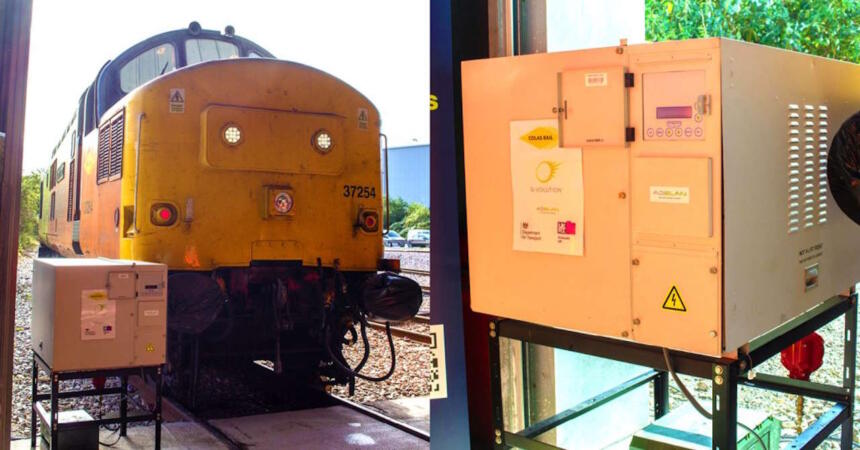In an initiative to decarbonise locomotive operations, Colas Rail UK's Freight Business has collaborated with G-Volution Ltd to generate power for auxiliary load by using solid oxide fuel cells (SOFC) running on Bio Liquefied Petroleum Gas (Bio-LPG) that has near net-zero carbon emissions.
The majority of locomotives on Britain's railways are heavily reliant on diesel, which is a major source of our carbon emissions. G-Volution approached Colas Rail UK suggesting a partnership in a project to install a SOFC into a Class 37 locomotive to power its auxiliary systems. SOFCs can run from various bio-fuels such as Bio-LPG, Bio-LNG and hydrogen, and process them to generate electricity.
On 21st September a proof of concept was demonstrated successfully showcased at Colas Rail UK's depot at Rugby in front of over 40 delegates who witnessed the SOFC providing power for the exterior and interior lighting Class 37 No. 37254.
The University of Birmingham has carried out route simulations using a 35kW SOFC, and these show that for a typical Class 37 operation using two locomotives, there will be an average saving of 50 tonnes of CO2e per annum, equivalent to 12%, and an average reduction in fuel costs of 8%.
This approach also brings about other benefits, including improved air quality, since SOFCs produce zero particulate matter and nitrogen oxides, and a significant reduction in noise whilst engines are idling.
As well as Colas and G-Volution, other organisations were involved in project, which was funded by the Department for Transport's Innovate UK First of a Kind competition. The main project contributors included:
- G-Volution – Project Lead and Engineering Lead
- Colas Rail UK – Class 37 Operator
- Aegis Engineering Systems – Standards and Approvals Consultant
- Adelan Ltd – SOFC Supplier
- DG8 (An Equans Company) – PoC Integration Design
- Pragmatex – Project Management
- SBL Rail – Systems Engineering
- Tully Engineering Limited – Emissions Measurement
- University of Birmingham – Engineering Support and Modelling
Speaking about the success of the trial, Paul Conway, Colas Rail UK's Head of Engineering and Compliance said “Innovation with a focus on decarbonisation is essential given the challenge to reduce dependency on fossil fuel. This trial has proven that a lower carbon option is available for auxiliary power generation. It's still early days for this technology but it's an excellent start and something that Colas Rail Services have been proud to be a part of”.

I am glad this system has happened with class 37 diesel Locomotive other classes can benefit from this reduction of fossil fuels great job and thankyou